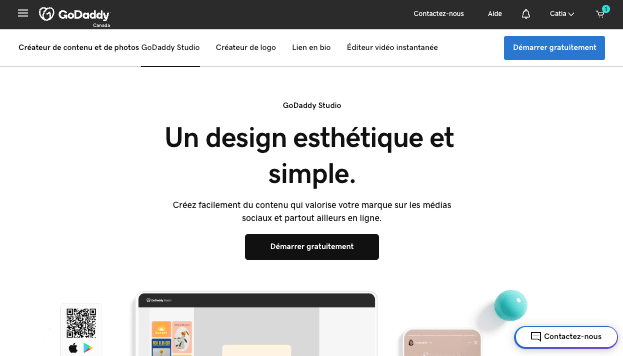Who can benefit from crowdfunding platforms? Companies that are just starting out sometimes need a financial boost to get things going. You're too new or untested for angel investors and venture capitalists, or maybe you've got your sights set on something smaller, and don't need $20 million to get things going.
I mean, you wouldn't say no. You're not stupid. But your small 3D printing studio doesn't really need $20 million, and the people who throw that kind of money around won't even get out of bed for the $30,000 you need to get things started.
This is where crowdfunding platforms can help.
Crowdfunding helps you get a large quantity of people to invest in your idea — rather than finding one person to come up with everything you need.
You've probably also heard the term "crowdsourcing," as in "we crowdsourced all the information about Robin Hood in order to create the best possible Robin Hood encyclopedia." That means ordinary people all contributed to an exhaustive pool of Robin Hood knowledge; the sum of everyone's information reduced the amount of time and energy it took to create The Big Book of Hood.
Crowdfunding is basically crowdsourced money.
Everyone chips in a little bit to achieve the ultimate goal. But while you can ask your friends and family to each kick in some cash, you don't necessarily want to ask 500 people to write you a check or hand you 20 bucks. For one thing, it can be uncomfortable. For another, it's time consuming.
Instead, you can use a crowdfunding platform to manage all the collections; it gives you a central location to share your mission, and any materials and videos that explain or support it. Once you reach your desired goal, you're expected to begin work on your project.
Finally, keep in mind that these crowdfunding platforms are not in the business of giving away their services. They take a cut of your donations, and some even require setup or promotional fees. I found services that charge fees as low as 2.5 percent of each donation to as much as 15 percent of your total capital. It depends on the service and what you're hoping to do. Do your research before you commit.
Here are 20 crowdfunding platforms you can use to fund and fuel your next big idea.
Some of these are more geared toward developing products, others are designed for funding artistic endeavors, and still others are ideally suited to nonprofits. Some sites will collect all the money as it comes in while others won't collect it until the goal amount is reached.
1. Kickstarter
This one is so popular that it's entered our everyday language. Kickstarter is geared more toward creative projects like a new album or writing a book as well as products and inventions like a personal single-wheel vehicle or a pocket-sized solar charger. It's not really for buying equipment or helping a nonprofit, and you don't get to keep your money unless you reach your goal through financial pledges.
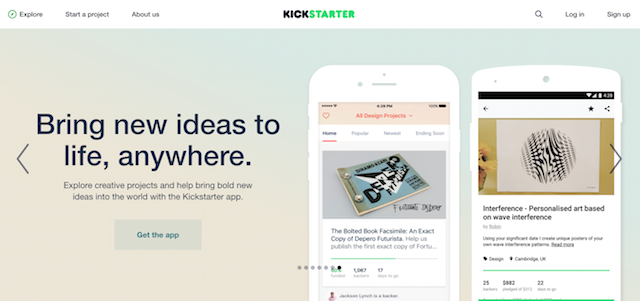
2. Indiegogo
I'm more familiar with this crowdfunding platform because I used it to help a friend and his nonprofit organization. Like Kickstarter, you can use Indiegogo to start up any project or idea. But unlike Kickstarter, you can set up nonprofits on the site. Indiegogo also offers Flexible Funding, which means you get to keep the funds you raised — even if you didn't reach your goal.
3. Patreon
Unlike all the other crowdfunding platforms in this list, Patreon is a monthly subscription platform that allows supporters and donors to provide regular contributions — rather than one bulk payment.
Patreon’s goal is not to support a particular project, but to provide ongoing support for a creative venture or artist, such as supporting your favorite web comic, band or musician, or even your favorite podcast.
I support the Canadaland and I Hear Of Sherlock Everywhere podcasts on Patreon because I enjoy them. For only a few bucks a month, I can make sure they're able to continue making their podcasts for me (and thousands of others) to enjoy.
4. GoFundMe
GoFundMe is the "hey, can I borrow 50 bucks" of crowdfunding platforms. I see it used mostly for personal emergencies, but you might have seen it used elsewhere. I've seen people use it to cover an emergency vet bill, a trip to the dentist, and even for a Kenyan farmer to attend an agricultural conference in Australia. In some cases, I've seen people use GoFundMe to raise money to cover uber-high medical bills for terminal illnesses.
5. PledgeMusic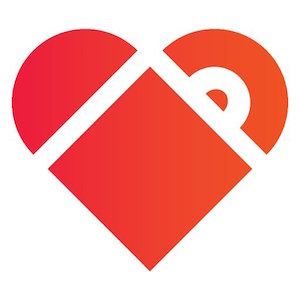
Being a musician can be pricey. (As the husband of a jazz singer and father to three budding musicians, I can attest to that!) So anything you can do to cover costs when you launch an album, promote it, or go on tour takes a load off. That's where PledgeMusic can make a real difference. And like most of these other crowdfunding platforms, you can provide rewards for donors who pledge a certain level such as downloadable digital music.
6. Razoo
This site is geared more toward helping "worthy causes," rather than material goods and profits, so if you're looking for business funding, this might not be a good bet. Razoo lets you fundraise for causes concerning children and family, education, animals and pets, and even faith-based causes.
7. RocketHub
RocketHub is more for entrepreneurs looking for venture capital, unlike most of these others. With their ELEQUITY Funding Room, you can pitch your project idea, and see if you can generate any interest among their funders and donors. They also have resources available on their website, like how-to articles for running and promoting your business.
8. Crowdrise
Like Razoo, Crowdrise is geared more toward helping "real world issues," rather than funding for-profit ventures. I saw projects for Haiti, including a boy who wanted to donate solar technology to Haiti for his bar mitzvah, and for January's Women's March on Washington. But you can also use it to fund birthday parties, weddings, and even college scholarships.
9. Appbackr
If you're a mobile developer looking to launch your first app, you can skip Kickstarter and GoFundMe, and raise your funds on Appbackr. Not only can backers fund apps that are on sale or currently in development, but backers can earn their money back once the app makes its earnings back in the app store. This won't make people rich, but they can see a small return on their efforts.
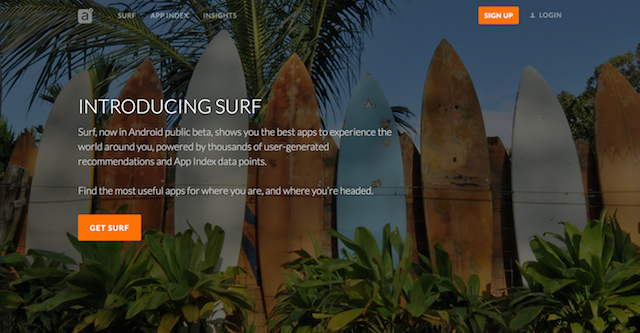
10. Crowdfunder
If you've gone through all the crowdfunding platforms, but you still want to try to land an angel investor or venture capitalist, you can catch their eye on Crowdfunder. Just like a regular venture capital program, you can sell equity and debt in your company to raise money and attract angels and VCs to your company at the same time. I saw projects that needed $1 million to $2 million in funding, but earned as much as five times that amount.
11. Give
This is a WordPress plugin you can add to your own WordPress blog and use to collect donations from visitors. And unlike every other crowdfunding platform I reviewed, Give does not take any fees based on what you raise. They make their money selling premium add-ons to their system.
12. Charitable
Another WordPress plugin, Charitable lets you collect donations on your website via PayPal, and they don't charge any transaction fees for credit card donations. You can also use well-known and trusted credit card processors like Stripe and Authorize.net to accept plastic.
13. Lending Club
This is a site for investors who want to invest their money, but still do a little good. As a borrower, you can borrow up to $40,000, and the investors will make between 5.5 percent and 7.7 percent as you repay the loan with interest. It's easier to get a loan on Lending Club than a normal bank, and they're more likely to fund unusual projects and ideas.
14. AngelList
OK, if your business idea didn't pan out, give AngelList a shot because you can apply for a job at more than 60,000 startups with a single application — it's the only site I found that lets you do that. But if you're looking for a place to invest, then AngelList has those opportunities as well. Oh, and you can still apply for funding, too. Just fill out an application and you'll be introduced to potential investors and lenders. This is not a worthy cause site like Razoo or Crowdrise; it's straight-up startup capitalism.
15. Ulule
I picked this one partly because it's an international crowdfunding platform, but also because I like to say the name. Ulule. Ulule. It's like saying ukulele, but without the “K.” Ulule funds mostly creative projects, and they've helped more than 16,000 artists and entrepreneurs in 198 countries. Don't let their international focus frighten you though. If you've got a worthwhile project you believe in, give Ulule a try. ULULE!
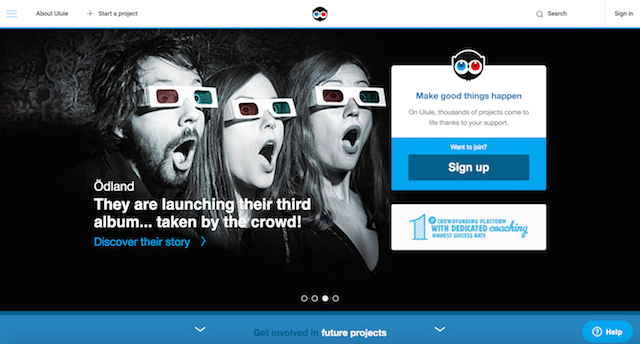
16. Funding Circle
A competitor to Lending Club, Funding Circle will give up to $50,000 in personal and business loans (interest rates start at 5.49 percent). They also give you the option to invest money. You can even choose the loans you want to participate in — just like backing projects on Kickstarter and Indiegogo.
17. Seed&Spark
If we have music-based platforms, then it stands to reason we'd have at least one for filmmakers. Enter Seed&Spark, the crowdfunding platform for movie makers around the world. Whether it's documentaries, dramatic films, or offbeat comedies, you can get funding for your movie, and even watch others' contributions.
18. Crowdcube
Crowdcube is another online investing site that lets investors choose which projects they want to back. It’s a great way for entrepreneurs to spread the risk of their new ventures a bit, while still getting the "grown up" funding of investors, but without needing to deal with banks and financial institutions who typically aren't interested in smaller projects.
19. GoGetFunding
I like the directness of this website's name — as if it's a command and not just an explanation of what they do. Similar to GoFundMe, another bossy platform, GoGetFunding will let you raise funds for any cause — whether personal, nonprofit, or even a business. I saw campaigns for raising healthcare funds for Syrian refugees, helping cover medical costs for a child, and building homes in Hong Kong. If you have a worthy cause to support and people to help, GoGetFunding and GoSaveTheWorld.
20. Kiva
Kiva is a special crowdfunding platform, and one I truly appreciate: the money raised here is not for you. Rather, you can become a micro lender to entrepreneurs and artists all over the world.
This is a way to help people who are in poor and underserved parts of the world get just a little bit of money to make a vast difference in their lives.
Whether it's lending $250 to a women's sewing group in Burkina Faso to buy sewing materials, or $2,000 to an Armenian photojournalist, you can loan a small amount to any borrower you choose, and as the loan is paid back, you can make a little bit of money in return.
Choose the platform that fits your needs.
Regardless of the work you want to do, the goals you want to accomplish, or the lives you want to change, there are crowdfunding platforms of all sizes, aims, and areas of focus. There are investors who want to see a return on their loans, and there are sites with the sole aim of funding creative projects or life-saving nonprofits.
Figure out your end goal, and start your research. Find a platform that will suit you and your desires, and then go all in. Don't split up your efforts between platforms because that will only confuse people. Focus on that one platform and that one goal, and tell everyone about it, until you raise your funds.
Part of being an entrepreneur is having the drive and passion to ask for money when you need it. These crowdfunding platforms make asking for that money much easier, and even let you give your donors and supporters a little something in return.




